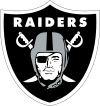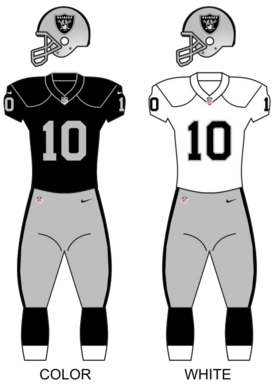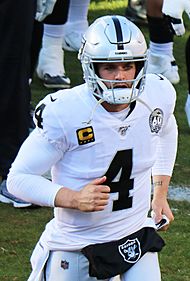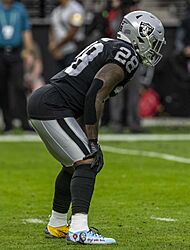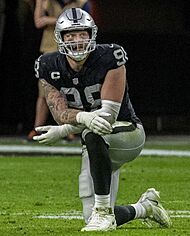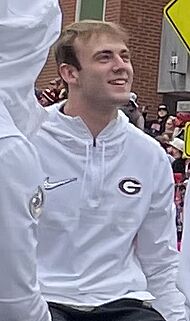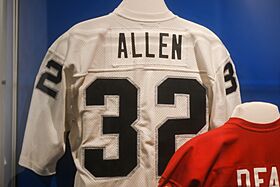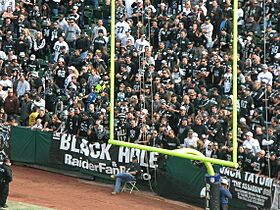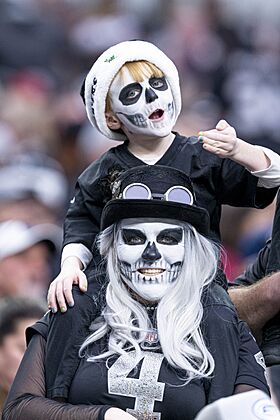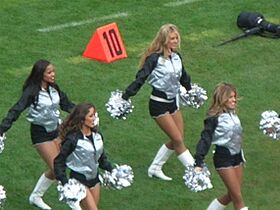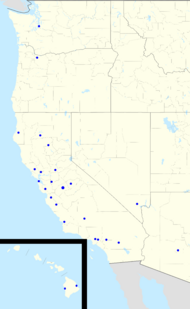Las Vegas Raiders facts for kids
Quick facts for kids Las Vegas Raiders |
|||||||||||||
|---|---|---|---|---|---|---|---|---|---|---|---|---|---|
|
|||||||||||||
| Basic info | |||||||||||||
| Established | January 30, 1960 | ||||||||||||
| Stadium | Allegiant Stadium Paradise, Nevada |
||||||||||||
| Headquartered | Intermountain Healthcare Performance Center Henderson, Nevada |
||||||||||||
| Colors | Silver, black |
||||||||||||
| Fight song | "The Autumn Wind" | ||||||||||||
| Mascot | Raider Rusher | ||||||||||||
| Personnel | |||||||||||||
| Owner(s) | Mark & Carol Davis | ||||||||||||
| President | Sandra Douglass Morgan | ||||||||||||
| General manager | John Spytek | ||||||||||||
| Head coach | Pete Carroll | ||||||||||||
| Nicknames | |||||||||||||
|
|||||||||||||
| Team history | |||||||||||||
|
|||||||||||||
| Home fields | |||||||||||||
|
|||||||||||||
| League / conference affiliations | |||||||||||||
American Football League (1960–1969)
National Football League (1970–present)
|
|||||||||||||
| Championships | |||||||||||||
League championships: 3†
|
|||||||||||||
Conference championships: 4
|
|||||||||||||
Division championships: 15
|
|||||||||||||
| Playoff appearances (23) | |||||||||||||
|
|||||||||||||
| Owner(s) | |||||||||||||
|
|||||||||||||
The Las Vegas Raiders are a professional American football team. They are based in the Las Vegas area in Nevada. The Raiders play in the National Football League (NFL). They are part of the American Football Conference (AFC) West division. Their home games are played at Allegiant Stadium in Paradise, Nevada. The team's main office is in Henderson, Nevada.
The Raiders started on January 30, 1960, in Oakland, California. Their first game was on September 11, 1960. They were a founding member of the American Football League (AFL). In 1970, they joined the NFL when the AFL and NFL merged. The team moved to Los Angeles from 1982 to 1994. Then they returned to Oakland in 1995. On March 27, 2017, NFL team owners approved the Raiders' move to Las Vegas. The team officially moved to Las Vegas on January 22, 2020.
The Raiders have had many ups and downs over the years. Their first three years were tough, with poor results and money problems. Things got much better in 1963 when Al Davis became head coach. Since 1963, the team has won 15 division titles. They also won one AFL championship in 1967. The Raiders have won four AFC championships. They also won three Super Bowl championships: XI (1976), XV (1980), and XVIII (1983).
Al Davis owned the team from 1972 until he passed away in 2011. His son, Mark Davis, and wife, Carol Davis, now own the team. The Raiders are famous for their huge fan base, known as the Raider Nation. Many former Raiders players and coaches are in the Pro Football Hall of Fame. The team has played in several stadiums over the years. These include Kezar Stadium and Candlestick Park in San Francisco. They also played at Frank Youell Field and the Oakland Coliseum in Oakland. In Los Angeles, they played at the Los Angeles Memorial Coliseum.
Contents
- Team History
- Championships and Titles
- Team Look and Home Fields
- Team Culture
- Cheerleaders
- Radio and Television
- Rivalries
- Team Ownership
- Players of Note
- Front Office and Coaching Staff
- See also
Team History
Early Years in Oakland (1960–1981)
The Oakland Raiders were almost called the "Oakland Señors." But after some jokes, the name was changed to the Raiders before the 1960 season. Eddie Erdelatz was the first head coach. The team was the last of eight to pick players in the new AFL. This meant they had to choose from the remaining players.
The 1960 Raiders team had many new players. Future Hall of Famer Jim Otto and future coach Tom Flores were among them. In their first year, the Raiders finished with 6 wins and 8 losses.
Coaching changes happened quickly in the early years. Eddie Erdelatz was fired in 1961. Marty Feldman and Red Conkright coached the team after that. The team struggled with only 1 win in 1962.
After the 1962 season, F. Wayne Valley hired Al Davis. Davis was only 33, making him the youngest coach and general manager in pro football. He brought an aggressive playing style. In 1963, the Raiders improved a lot, winning 10 games. Davis was named the AFL's Coach of the Year. The team's famous silver and black uniforms first appeared in 1963.
In 1966, Davis became the AFL Commissioner. John Rauch took over as head coach. Soon after, the AFL and NFL announced they would merge. Davis returned to the Raiders as a part-owner and head of football operations.
AFL Champions (1967)
The team kept getting better under Davis. With quarterback Daryle Lamonica, the Raiders had a great 1967 season. They finished with 13 wins and 1 loss. They won the AFL Championship by beating the Houston Oilers 40–7. This win sent them to Super Bowl II. On January 14, 1968, the Raiders lost to the Vince Lombardi's Green Bay Packers 33–14.
In 1968, the Raiders won their division again with 12 wins. But they lost to the New York Jets in the AFL Championship Game. Coach Rauch resigned in 1969.
John Madden became the Raiders' head coach in 1969. Under Madden, the Raiders won their division for the third year in a row. They had 12 wins, 1 loss, and 1 tie. They beat the Oilers in the playoffs. But they lost to the Kansas City Chiefs in the AFL Championship game.
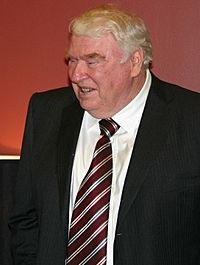
In 1970, the AFL and NFL officially merged. The Raiders joined the AFC West division. They won their division in 1970 but lost in the conference championship. The 1970s Raiders were a very strong team. They had many Hall of Fame players and a Hall of Fame coach in John Madden. The team became known for its tough, hard-hitting style. Players like Jack Tatum and George Atkinson were known for their big hits.
The Raiders had a big rivalry with the Pittsburgh Steelers in the 1970s. These two teams were often the best in the AFC. They played each other five times in the playoffs. The winner of their game often went on to win the Super Bowl. This rivalry was known for controversial plays and intense competition.
In 1972, the Raiders lost to the Steelers on a famous play called the "Immaculate Reception." The Raiders won their division again in 1973. Quarterback Ken Stabler took over as the starter. They beat Pittsburgh in the playoffs but lost to the Miami Dolphins.
In 1974, Oakland had 12 wins. They beat the Dolphins in a close game called the "Sea of Hands." But they lost to the Steelers in the AFC Championship. In 1975, the Raiders beat Miami to end their long home winning streak. They again lost to the Steelers in the AFC Championship.
Super Bowl XI Champions (1976)
In 1976, the Raiders beat Pittsburgh in a close season opener. They won 13 regular-season games. They had a controversial win over New England in the playoffs. Then they beat the Steelers 24–7 in the AFC Championship. This sent them to their second Super Bowl. In Super Bowl XI, the Raiders played the Minnesota Vikings. The Raiders took an early lead and won 32–14. This was their first Super Bowl championship.
In 1977, the Raiders finished with 11 wins. They lost their division to the Denver Broncos. They won a wild card game against the Colts in a very long overtime game. But they lost to the Broncos in the AFC Championship.
John Madden left coaching in 1979. Former Raiders quarterback Tom Flores became the new head coach. Flores was the first Hispanic head coach in NFL history.
Super Bowl XV Champions (1980)
In 1980, the Raiders had 11 wins and made the playoffs as a wild card team. Quarterback Jim Plunkett played very well after the starter was injured. The Raiders beat the Oilers and Browns in the playoffs. They then beat the San Diego Chargers to reach their third Super Bowl. In Super Bowl XV, the Raiders played the Philadelphia Eagles. The Raiders won 27–10. They became the first wild card team to win the Super Bowl.
Los Angeles Raiders (1982–1994)
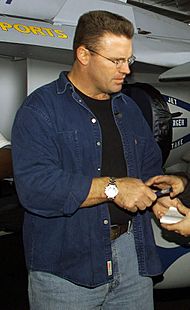
In 1982, the Raiders moved from Oakland to Los Angeles. They played their home games at the Los Angeles Memorial Coliseum. The 1982 season was shorter due to a player strike. The Los Angeles Raiders finished with 8 wins and 1 loss. But they lost in the second round of the playoffs.
Super Bowl XVIII Champions (1983)
In 1983, the Raiders won their division with 12 wins. They had strong playoff wins over the Steelers and Seahawks. This sent them to their fourth Super Bowl. They played the Washington Redskins in Super Bowl XVIII. The Raiders played a great game. Running back Marcus Allen had an amazing 74-yard touchdown run. The Raiders won 38–9, earning their third NFL championship. Allen set a Super Bowl record for most rushing yards.
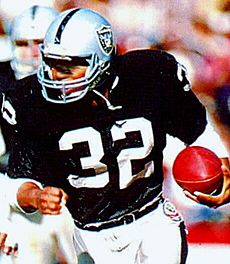
The team had another good season in 1984, with 11 wins. But they lost in the wild card playoff game. In 1985, the Raiders won 12 games and their division. Marcus Allen was named the league's MVP. But they lost in the playoffs.
After 1985, the Raiders' performance declined. They had losing seasons for the first time in many years. In 1987, Bo Jackson joined the team. He also played baseball for the Kansas City Royals. This meant he could not play football full-time until baseball season ended.
Art Shell became the head coach in 1989. He was the first African American head coach in the modern NFL. In 1990, Shell led the Raiders to 12 wins. They beat the Cincinnati Bengals in the playoffs. But Bo Jackson suffered a serious hip injury in that game. Without him, the Raiders lost badly to the Buffalo Bills in the AFC Championship. Jackson had to stop playing football because of his injury.
The Raiders struggled with quarterbacks in the early 1990s. They made the playoffs in 1991 and 1993. In 1993, they beat the Broncos in the wild card game. But they lost to the Bills again in the next round. After missing the playoffs in 1994, Art Shell was fired.
Second Oakland Era (1995–2019)
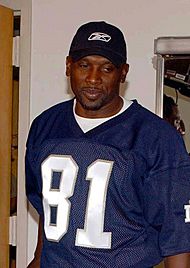
In 1995, the Raiders moved back to Oakland. The city spent a lot of money to improve the stadium. This included adding 10,000 new seats. The Raiders paid a small amount for rent. The move was very exciting for fans.
Under new head coach Mike White, the 1995 season started well. Oakland had 8 wins and 2 losses. But injuries to quarterback Jeff Hostetler led to a losing streak. They finished 8–8 and missed the playoffs. After two more losing seasons, Jon Gruden became head coach in 1998.
In 2000, Oakland had their best season in a decade, with 12 wins. Quarterback Rich Gannon was named MVP. They won their division and reached the AFC Championship. But Gannon was injured, and the Raiders lost to the Baltimore Ravens.
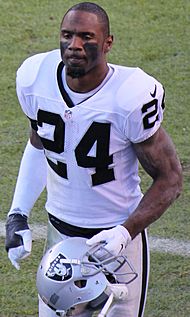
The Raiders added star receiver Jerry Rice in 2001. They started strong but lost their last three games. They made the playoffs as a wild card team. They beat the New York Jets. Then they faced the New England Patriots in a snowy game. This game became known as the "Tuck Rule Game." A controversial call went against the Raiders. The Patriots won in overtime and later won the Super Bowl.
In 2002, the Raiders let Jon Gruden go to coach the Tampa Bay Buccaneers. In return, they received money and draft picks. Bill Callahan, the team's offensive coordinator, became head coach.
Under Callahan, the 2002 Raiders won 11 games. They won their division for the third year in a row. Rich Gannon was named NFL MVP. The Raiders easily won their playoff games against the Jets and Titans. This sent them to Super Bowl XXXVII. Their opponent was the Tampa Bay Buccaneers, coached by Jon Gruden. The Buccaneers knew the Raiders' plays well. The Raiders lost 48–21.
Callahan's second season in 2003 was not good. Oakland finished with only 4 wins. Callahan was fired and Norv Turner became head coach. The team continued to struggle, finishing 5–11 in 2004. Rich Gannon suffered a career-ending neck injury. Kerry Collins became the starting quarterback.
In 2005, the Raiders added star receiver Randy Moss. But they still finished 4–12. Turner was fired. In 2006, Art Shell returned as head coach. The team had its worst record since 1962, with only 2 wins. Shell was fired again.
In 2007, Lane Kiffin became the youngest coach in the NFL at 31. The Raiders drafted quarterback JaMarcus Russell with the first pick. Russell struggled, and Kiffin was fired in 2008. Tom Cable took over as head coach. The team finished 5–11 in both 2008 and 2009. In 2010, the Raiders won all their division games but still missed the playoffs. Cable's contract was not renewed.
Hue Jackson became head coach in 2011. After Al Davis passed away, his son Mark and wife Carol took over the team. The Raiders finished 8–8 in 2011 and missed the playoffs. Reggie McKenzie was hired as the team's first general manager since Al Davis.
In 2012, Dennis Allen became head coach. The team finished 4–12. In 2013, the Raiders made many roster changes. They signed Charles Woodson again. They finished 4–12 once more.
In the 2014 NFL Draft, the Raiders picked Khalil Mack and quarterback Derek Carr. Carr became the starting quarterback right away. After an 0–4 start, Allen was fired. Tony Sparano became interim head coach. The Raiders finished 3–13.
Jack Del Rio was hired as head coach in 2015. The Raiders improved to 7–9. Derek Carr continued to get better. Khalil Mack was named an All-Pro at two positions, a first in NFL history.
In 2016, the Raiders, Rams, and Chargers all wanted to move to Los Angeles. The NFL approved the Rams' move. The Chargers were given an option to move too. The Raiders were given permission if the Chargers did not move. The NFL offered money to teams if they stayed in their home cities. The Chargers moved to Los Angeles in 2017.
Meanwhile, Sheldon Adelson proposed a new stadium in Las Vegas. Mark Davis pledged money for the stadium. Nevada approved public money for the stadium. Davis told NFL owners he wanted to move the team to Las Vegas.
In 2016, the Raiders had their first winning season since 2002. They made the playoffs for the first time since 2002. They had seven Pro Bowl players, the most in the NFL that year. In the playoffs, the Raiders lost to the Houston Texans due to many injuries, including to Derek Carr.
On January 19, 2017, the Raiders filed to move to Las Vegas. The NFL approved the move on March 27, 2017, with a 31–1 vote. The team announced they would stay in Oakland until 2020.
Before the 2017 season, Derek Carr signed a big contract. The Raiders hoped for a great season. But they finished 6–10. Head coach Del Rio was fired.
Jon Gruden's Return and Final Years in Oakland (2018–2019)
On January 6, 2018, Jon Gruden returned as head coach. He signed a 10-year contract. The Raiders traded away star players Khalil Mack and Amari Cooper. The team finished 4–12 in 2018. Mike Mayock became the new general manager. In 2019, the team improved to 7–9 in their last season in Oakland.
Las Vegas Raiders (2020–Present)
On January 22, 2020, the Raiders officially moved to Las Vegas. The 2020 season was played without fans due to the COVID-19 pandemic. The team started 6–3 but finished 8–8 and missed the playoffs.
In 2021, Jon Gruden resigned as head coach. Rich Bisaccia was named interim head coach. The Raiders finished 10–7 and made the playoffs. They lost to the Cincinnati Bengals in the Wild Card Round.
Josh McDaniels and Dave Ziegler Era (2022–2023)
On January 30, 2022, Dave Ziegler became general manager. The next day, Josh McDaniels was hired as head coach. In 2022, the Raiders finished 6–11. After the season, Derek Carr was released.
The Raiders signed Jimmy Garoppolo and drafted Aidan O'Connell. On October 31, 2023, McDaniels and Ziegler were let go. Linebackers coach Antonio Pierce became interim head coach. The team set a franchise record by scoring 63 points in a game. They finished 8–9 under Pierce. In January 2024, Pierce became the permanent head coach. After one season where he led the Raiders to a 4–13 record, Pierce was fired as head coach.
Pete Carroll and John Spytek Era (2025)
On January 25, 2025, Pete Carroll was hired as the Raiders' head coach. He came from the Seattle Seahawks. When he coaches his first game, he became the oldest head coach in NFL history. The Raiders also traded for quarterback Geno Smith, reuniting him with Carroll.
Championships and Titles
AFL Championships
The Raiders won the 1967 AFL Championship. They finished that season with 13 wins and 1 loss. They later played in Super Bowl II.
| Season | Coach | Location | Opponent | Score |
|---|---|---|---|---|
| 1967 | John Rauch | Oakland-Alameda County Coliseum (Oakland) | Houston Oilers | 40–7 |
| Total AFL Championships won: 1 | ||||
Super Bowl Championships
The Raiders have won three Super Bowl championships. John Madden coached their first Super Bowl win. Tom Flores coached their next two wins.
| Season | Coach | Super Bowl | Location | Opponent | Score |
|---|---|---|---|---|---|
| 1976 | John Madden | XI | Rose Bowl (Pasadena) | Minnesota Vikings | 32–14 |
| 1980 | Tom Flores | XV | Louisiana Superdome (New Orleans) |
Philadelphia Eagles | 27–10 |
| 1983 | XVIII | Tampa Stadium (Tampa) | Washington Redskins | 38–9 | |
| Total Super Bowls won: 3 | |||||
AFC Championships
| Season | Coach | Location | Opponent | Score |
|---|---|---|---|---|
| 1976 | John Madden | Oakland-Alameda County Coliseum (Oakland) | Pittsburgh Steelers | 24–7 |
| 1980 | Tom Flores | Jack Murphy Stadium (San Diego) | San Diego Chargers | 34–27 |
| 1983 | Los Angeles Memorial Coliseum (Los Angeles) | Seattle Seahawks | 30–14 | |
| 2002 | Bill Callahan | Network Associates Coliseum (Oakland) | Tennessee Titans | 41–24 |
| Total AFC Championships won: 4 | ||||
Division Championships
| Year | Coach | Record |
|---|---|---|
| 1967 | John Rauch | 13–1 |
| 1968 | 12–2 | |
| 1969 | John Madden | 12–1–1 |
| 1970 | 8–4–2 | |
| 1972 | 10–3–1 | |
| 1973 | 9–4–1 | |
| 1974 | 12–2 | |
| 1975 | 11–3 | |
| 1976 | 13–1 | |
| 1983 | Tom Flores | 12–4 |
| 1985 | 12–4 | |
| 1990 | Art Shell | 10–6 |
| 2000 | Jon Gruden | 12–4 |
| 2001 | 10–6 | |
| 2002 | Bill Callahan | 11–5 |
| Total Division Championships won: 15 | ||
Team Look and Home Fields
Logos and Uniforms
When the team started in 1960, a contest was held to name them. The winning name was the "Oakland Señors." But after some jokes, the name was changed to the Oakland Raiders. This name had finished third in the contest.
The first Raiders logo showed a pirate wearing a football helmet. He had an eye patch and two crossed swords behind a gold football. The original uniforms were black and gold.
In 1963, Al Davis changed the team's colors to silver and black. He also added the pirate logo to the helmet. This logo has stayed mostly the same over the years.
The Raiders' silver and black uniforms have been the same since 1963. They have silver helmets and silver pants. The jerseys are either black or white. Black jerseys have silver names and numbers. White jerseys have black names and numbers with silver outlines.
In 2008, the Raiders wore their white jerseys at home for the first time. This was because of the heat. For the 2009 season, the Raiders wore old-style jerseys. These were from the 1960s AFL era.
The team wore black cleats as a tribute to Al Davis in 2012 and 2013. In 2016, the Raiders brought back their classic white jerseys with silver numbers. These were part of the NFL Color Rush program. When the team moved to Las Vegas, their uniforms and logos stayed the same. Only the city name changed from "OAKLAND" to "LAS VEGAS."
Home Fields
The Raiders played their first home season in San Francisco. They used Kezar Stadium and Candlestick Park. In 1961, they played only at Candlestick Park.
In 1962, the Raiders moved to Frank Youell Field in Oakland. This was a temporary home. The 53,000-seat Oakland Coliseum was being built. The Coliseum was finished in 1966. The Raiders shared it with the Oakland Athletics baseball team.
The Raiders played one game at California Memorial Stadium in Berkeley. This was in 1973 due to a scheduling conflict. They beat the Miami Dolphins in that game.
During their time in Los Angeles, the Raiders played at the 93,000-seat Los Angeles Memorial Coliseum.
Since Mark Davis took over in 2011, the team looked for a new stadium. The Oakland Coliseum was old. The team also shared it with the Athletics. In 2020, the team moved to the Las Vegas area. They now play at Allegiant Stadium. The Raiders share this 65,000-seat stadium with the UNLV Rebels football team.
Team Culture
Slogans
Al Davis created famous slogans for the team. These include "Pride and Poise," "Commitment to Excellence," and "Just Win, Baby." These are all registered trademarks of the team.
Raider Nation
The nickname Raider Nation refers to the team's fans. They are spread across the United States and the world. Fans who go to home games are known for arriving early. They enjoy tailgating and dressing up in masks and black outfits. The "Black Hole" was a special section at the Oakland Coliseum. It was where the team's most passionate fans gathered.
Al Davis created the phrase Raider Nation in 1968. In 2009, Ice Cube recorded a song for the Raiders called "Raider Nation." In 2012, Ice Cube wrote another song for the team, "Come and Get It."
Cheerleaders
The Las Vegas Raiderettes are the cheerleading squad for the Raiders. They started in 1961 as the Oakland Raiderettes. They were called the Los Angeles Raiderettes when the team was in Los Angeles. They are known as "Football's Fabulous Females."
Radio and Television
Las Vegas Raiders Radio Network
Raiders games are broadcast on many radio stations. These stations are across the western United States. The main stations in Las Vegas are KOMP 92.3 FM and KRLV 920 AM. Games are also heard in Nevada, California, Oregon, Colorado, Hawaii, and Arkansas.
Jason Horowitz is the play-by-play announcer. Former Raiders player Lincoln Kennedy does commentary. George Atkinson and Jim Plunkett provide pre- and post-game commentary.
Bill King was the voice of the Raiders from 1966 to 1992. He called about 600 games. His radio calls are often heard in NFL Films highlights. King passed away in 2005.
Television
Raiders games are shown on TV in Las Vegas. They are on CBS affiliate KLAS-TV (channel 8). In the Bay Area, they are on CBS station KPIX-TV (channel 5). This is when the Raiders play an AFC opponent. When they host an NFC opponent, games are on Fox affiliate KVVU-TV (channel 5) in Las Vegas. In the Bay Area, they are on Fox station KTVU (channel 2).
Sunday night games are on NBC affiliate KSNV (channel 3) in Las Vegas. They are on NBC station KNTV (channel 11) in the Bay Area. Thursday games are on KTVU and KVVU-TV. All Thursday games also air on NFL Network. Monday night games on ESPN are usually shown on ABC affiliate KTNV-TV (channel 13) in Las Vegas. In San Francisco, they are on ABC station KGO-TV (channel 7).
When the Raiders were in Oakland, they shared the Bay Area market with the San Francisco 49ers. This meant their game times were often adjusted. They also had more prime time games than usual.
Since the move to Las Vegas, KVVU-TV shows all Raiders preseason games. Other stations also show Raiders content. These include KRON-TV in the Bay Area and KTLA in Los Angeles.
Rivalries
Divisional Rivals
Kansas City Chiefs
The Chiefs are a major rival for the Raiders. This rivalry goes back to the early days of the AFL. The Raiders lost the 1969 AFL Championship to Kansas City. The Chiefs then won the Super Bowl.
From 1990 to 1999, the Raiders lost many games to the Chiefs. This included a 10-game losing streak in Kansas City. The Raiders finally beat the Chiefs in Kansas City in 2000. On October 19, 2017, the Raiders beat the Chiefs 31–30 in a thrilling game. In 2020, the Raiders beat the Chiefs 40–32. On Christmas Day 2023, the Raiders defeated the Chiefs again.
The Chiefs lead the overall series with 71 wins, 54 losses, and 2 ties. They are the only team in the AFC West that the Raiders have a losing record against.
Denver Broncos
The Raiders' rivalry with the Broncos is one of the most intense in NFL history. The Raiders had a 14-game winning streak against the Broncos from 1965 to 1971. This streak ended in 1972.
The Broncos won many games against the Raiders from 1995 to 2008. This was when Mike Shanahan coached the Broncos. Shanahan used to coach the Raiders, which made the rivalry even stronger. In 2015, the Raiders upset the Broncos 15–12. Linebacker Khalil Mack had five sacks in that game. The Broncos reached their first Super Bowl by beating the Raiders in the AFC Championship. These two teams have played on Monday Night Football 19 times, more than any other matchup.
The Raiders lead the all-time series with 72 wins, 53 losses, and 2 ties.
Los Angeles Chargers
The Los Angeles Chargers rivalry with the Raiders started in 1963. The Raiders beat the Chargers twice that year in comeback wins. The Raiders had a long streak without losing to the Chargers from 1968 to 1977.
One famous game was the "Holy Roller" game in 1978. The Raiders won on a controversial fumbled play. In 1981, the Raiders beat the Chargers 34–27 in the AFC Championship. The Raiders then went on to win Super Bowl XV. In 1982, the Raiders had a big comeback win against the Chargers on Monday Night Football. On October 10, 2010, the Raiders ended a 13-game losing streak against the Chargers.
The Raiders lead the overall series with 67 wins, 57 losses, and 2 ties.
Conference Rivals
Pittsburgh Steelers
The Pittsburgh Steelers rivalry with the Raiders has been very close. The Raiders lead the regular-season series 13 wins to 10. Their playoff rivalry is tied 3–3. This rivalry was very intense in the 1970s. Many called it one of the most brutal in football history. From 1972 to 1976, the teams met in the playoffs five times. This included three AFC Championship games.
The rivalry started with the "Immaculate Reception" play in 1972. The Steelers won on a controversial last-second play. In 1975, Raiders player George Atkinson hit Steelers receiver Lynn Swann, causing a concussion. Steelers coach Chuck Noll called Atkinson part of the "criminal element." Atkinson sued Noll but lost.
The rivalry cooled down for a while. But it became intense again in the late 1990s. In 2009, the Raiders upset the Steelers 27–24. In 2018, the Raiders upset the Steelers again 24–21. This game contributed to the Steelers missing the playoffs. As of the 2023 season, the Raiders lead the all-time series 17–15.
New England Patriots
The rivalry between the Raiders and New England Patriots began in the AFL. It became more intense after a 1978 preseason game. Patriots receiver Darryl Stingley was seriously injured by a hit from Raiders player Jack Tatum. New England also lost a playoff game to the Raiders in 1976. This game is known for a controversial penalty.
The teams met in a playoff game in 2002. This game became known as the "Tuck Rule Game." A play by Patriots quarterback Tom Brady was ruled an incomplete pass instead of a fumble. This allowed the Patriots to win in overtime. They went on to win the Super Bowl. Since that game, the Patriots have won most of the regular-season games. In 2022, the Raiders finally beat New England again. A failed lateral pass by New England led to a Raiders touchdown and a 30–24 win. The Raiders won again in 2023, 21–17. As of the 2023 season, the Patriots lead the all-time series 20–17–1.
Historic Rivals
Miami Dolphins
The Raiders played the Miami Dolphins three times in the early 1970s. The Raiders won in the 1970 playoffs. But the Dolphins won the 1973 AFC Championship Game. In 1974, the Raiders beat the Dolphins in a playoff game. This game featured a famous play called the "Sea of Hands." As of the 2023 season, the Raiders lead the all-time series 21–20–1.
New York Jets
The New York Jets had a strong rivalry with the Raiders in the 1960s. This continued into the 1970s. Famous games include the "Heidi Game" in 1968. The Raiders lost to the Jets in the AFL Championship that year. The rivalry had a small comeback from 2000–2002. The Jets beat the Raiders in the last week of the 2001 season. But the Raiders beat the Jets in the playoffs the next week. In 2002, the Raiders beat the Jets twice. In 2020, Derek Carr threw a game-winning touchdown to beat the Jets 31–28. In 2023, the Raiders won 18–12. As of the 2023 season, the Raiders lead the all-time series 27–20–2.
Seattle Seahawks
As of the 2023 season, the Raiders lead the all-time series 30–26.
Houston Oilers/Tennessee Titans
The Raiders played the Houston Oilers many times in the AFL. They won two playoff games against them in the late 1960s. Oakland also beat the Oilers in the 1980 Wild Card playoffs. They defeated the Titans in the 2002 AFC Championship Game. As of the 2023 season, the Raiders lead the all-time series 30–22.
Battle of the Bay
The San Francisco 49ers were the Raiders' local rivals when the Raiders were in Oakland. Games between them were called the "Battle of the Bay." Since they are in different conferences, they only play every four years. Fans would brag about which team was better. In 2011, a preseason game between them had fights in the stands. The NFL decided to cancel all future preseason games between them. The last game between the two teams was in 2018. The 49ers won that game. As of the 2023 season, the 49ers lead the all-time series 8–7.
Battle of Los Angeles
When the Raiders were in Los Angeles, they shared the market with the Los Angeles Rams. This was called the "Battle of Los Angeles." Both teams moved after the 1994 season. The rivalry ended then. As of the 2023 season, the Raiders lead the all-time series 8–7.
Team Ownership
Founding the Team
The city of Oakland was given the eighth AFL team on January 30, 1960. At first, Oakland seemed like an unlikely place for a pro football team. The city did not ask for a team. There was no ownership group or a suitable stadium in Oakland. Also, the San Francisco 49ers were already a successful NFL team nearby. The AFL owners chose Oakland because the Los Angeles Chargers owner wanted another team on the West Coast.
Oakland leaders found businesspeople to invest in the team. A group of owners was formed. Chet Soda was the main partner. The 1960 Raiders lost money in their first season. F. Wayne Valley helped the team by getting a loan.
In 1962, Valley hired Al Davis as head coach and general manager. In 1966, Davis became the AFL Commissioner. After the AFL and NFL merged, Davis returned to the Raiders as a part-owner. He bought 10% of the team. He also gained control over football operations.
In 1972, Al Davis became the main managing partner. He had full control over the team. In 1976, Wayne Valley sold his share of the team. Even though Davis only owned 25% at first, he made all the decisions.
Current Ownership
The team is owned by a group of partners. A. D. Football, Inc., founded by Al Davis, is the main partner. The families of the original partners are also involved.
Al Davis had almost total control of the Raiders until he passed away in 2011. His wife, Carol, inherited his share. Their son, Mark, became the managing general partner. He now runs the team.
Team Value
In 2017, Forbes Magazine reported the Raiders' team value was $2.38 billion. This ranked them 19th out of 32 NFL teams. The team's value went up after they announced their move to Las Vegas.
The team has sold out games regularly since 2013. But from 2003 to 2005, they had low attendance. This was partly because of expensive "Personal Seat Licenses" (PSLs). These were needed to buy season tickets. In 2005, the team stopped selling PSLs. They also lowered ticket prices in 2006. This helped them sell more season tickets.
Players of Note
Current Roster
|
Las Vegas Raiders roster
|
|||||||||
|---|---|---|---|---|---|---|---|---|---|
Quarterbacks
Running backs
Wide receivers
Tight ends
|
Offensive linemen
Defensive linemen
|
Linebackers
Defensive backs
Special teams
|
Reserve lists
→ AFC rosters → NFC rosters |
||||||
Pro Football Hall of Fame Members
The Pro Football Hall of Fame has honored many Raiders. This includes 17 players who played most of their careers with the team. It also includes coach-owner-commissioner Al Davis, head coach John Madden, head coach Tom Flores, and executive Ron Wolf. In total, 31 Hall of Famers have been part of the Raiders.
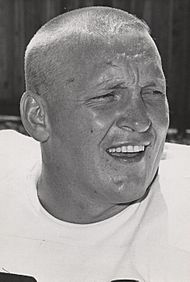
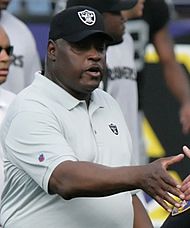
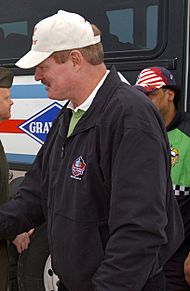
Notes:
- Hall of Famers who played most of their career for the Raiders are in bold.
- Hall of Famers who played a smaller part of their career with the Raiders are in normal font.
| Oakland / Los Angeles / Las Vegas Raiders in the Pro Football Hall of Fame | ||||
|---|---|---|---|---|
| Players | ||||
| No. | Name | Position(s) | Tenure | Inducted |
| 77 | Ron Mix | OT | 1971 | 1979 |
| 00 50 |
Jim Otto | C | 1960–1974 | 1980 |
| 16 | George Blanda | QB/K | 1967–1975 | 1981 |
| 24 | Willie Brown | CB DB coach Director of Staff Development |
1967–1978 1979–1988 1995–2019 |
1984 |
| 63 | Gene Upshaw | G | 1967–1981 | 1987 |
| 14 25 |
Fred Biletnikoff | WR WR coach |
1965–1978 1989–2006 |
1988 |
| 78 | Art Shell | OT OL coach Head coach |
1968–1982 1983–1989 1989–1994, 2006 |
1989 |
| 83 | Ted Hendricks | LB | 1975–1983 | 1990 |
| 22 | Mike Haynes | CB | 1983–1989 | 1997 |
| 29 | Eric Dickerson | RB | 1992 | 1999 |
| 75 | Howie Long | DE | 1981–1993 | 2000 |
| 42 | Ronnie Lott | S | 1991–1992 | 2000 |
| 87 | Dave Casper | TE | 1974–1980, 1984 | 2002 |
| 32 | Marcus Allen | RB | 1982–1992 | 2003 |
| 80 | James Lofton | WR WR coach |
1987–1988 2008 |
2003 |
| 76 | Bob Brown | OT | 1971–1973 | 2004 |
| 26 | Rod Woodson | S CB coach Assistant DB coach |
2002–2003 2011 2015–2017 |
2009 |
| 80 | Jerry Rice | WR | 2001–2004 | 2010 |
| 99 | Warren Sapp | DT | 2004–2007 | 2013 |
| 8 | Ray Guy | P | 1973–1986 | 2014 |
| 81 | Tim Brown | WR | 1988–2003 | 2015 |
| 12 | Ken Stabler | QB | 1970–1979 | 2016 |
| 18 | Randy Moss | WR | 2005–2006 | 2018 |
| 24 | Charles Woodson | CB | 1998–2005 2013–2015 |
2021 |
| 21 | Cliff Branch | WR | 1972–1985 | 2022 |
| 92 | Richard Seymour | DE | 2009–2012 | 2022 |
| 21 | Eric Allen | CB | 1998–2001 | 2025 |
| Coaches and Contributors | ||||
| Name | Position(s) | Tenure | Inducted | |
| Al Davis | Coach-Owner-Commissioner | 1963–2011 | 1992 | |
| John Madden | Head Coach | 1969–1978 | 2006 | |
| Ron Wolf | Scout Player Personnel Director |
1963–1974 1979–1989 |
2015 | |
| Tom Flores | Head Coach | 1979–1987 | 2021 | |
Retired Numbers
The Raiders do not officially retire jersey numbers. All numbers are available for any player.
Individual Awards
|
|
|
||||||||||||||||||||||||||||||||||||||||||||
|
|
|
|||||||||||||||||||||||||||||||||||||
|
|
|
|||||||||||||||||||||||||||
|
||||||||||||
Career Leaders
- Passing yards: 35,222 Derek Carr (2014–2022)
- Pass completions: 3,201 Derek Carr (2014–2022)
- Passing touchdowns: 217 Derek Carr (2014–2022)
- Rushing yards: 8,545 Marcus Allen (1982–1992)
- Rushing touchdowns: 79 Marcus Allen (1982–1992)
- Receptions: 1,070 Tim Brown (1988–2003)
- Receiving yards: 14,734 Tim Brown (1988–2003)
- Receiving touchdowns: 99 Tim Brown (1988–2003)
- Total touchdowns: 104 Tim Brown (1988–2003)
- Points: 1,799 Sebastian Janikowski (2000–2016)
- Field goals made: 414 Sebastian Janikowski (2000–2016)
- Total punt yardage: 48,215 Shane Lechler (2000–2012)
- Punting average: 47.5 Shane Lechler (2009)
- Kickoff return yards: 4,841 Chris Carr (2005–2007)
- Punt Return yards: 3,272 Tim Brown (1988–2003)
- Pass interceptions: 39 Willie Brown (1967–1978), Lester Hayes (1977–1986)
- Defended passes/pass deflections: 84 Charles Woodson (1998–2015)
- Sacks: 107.5 Greg Townsend (1983–1997)
- Forced fumbles: 18 Charles Woodson (1998–2015)
- Winningest coach: 103 John Madden (1969–1978)
Single-Season Leaders
- Passing yards: 4,804 Derek Carr (2021)
- Passing touchdowns: 34 Daryle Lamonica (1969)
- Rushing yards: 1,759 Marcus Allen (1985)
- Rushing touchdowns: 16 Pete Banaszak (1975)
- Receptions: 112 Brock Bowers (2024)
- Receiving yards: 1,516 Davante Adams (2022)
- Receiving touchdowns: 16 Art Powell (1963)
- Total touchdowns: 18 Marcus Allen (1984)
- Points: 150 Daniel Carlson (2021)
- Field goals made: 40 Daniel Carlson (2021)
- Total punt yardage: 4,930 Marquette King (2014)
- Punting average: 51.1 Shane Lechler (2009)
- Kickoff return yards: 1,762 Chris Carr (2006)
- Punt return yards: 692 Fulton Walker (1985)
- Pass interceptions: 13 Lester Hayes (1980)
- Sacks: 16.0 Derrick Burgess (2005)
All-Pro Selections
The following Raiders players have been named to the All-Pro team:
- QB Daryle Lamonica, Ken Stabler, Rich Gannon (2)
- RB Clem Daniels (4), Marcus Allen (3), Josh Jacobs (1)
- FB Hewritt Dixon, Marcel Reece (1)
- WR Cliff Branch (3), Tim Brown, Fred Biletnikoff (2), Art Powell, Davante Adams (1)
- TE Dave Casper, Todd Christensen (4), Billy Cannon (2)
- T Art Shell (4), Harry Schuh, Lincoln Kennedy (2)
- G Gene Upshaw (5), Steve Wisniewski (2), Kelechi Osemele (1)
- C Jim Otto (10), Barret Robbins (1)
- DE Howie Long, Khalil Mack (2), Ben Davidson (1)
- DT Tom Keating, Dan Birdwell, Bill Pickel, Chester McGlockton, Darrell Russell (1)
- LB Ted Hendricks (3), Rod Martin, Archie Matsos, Khalil Mack (1)
- CB Willie Brown, Nnamdi Asomugha (4), Dave Grayson, Charles Woodson (3), Fred Williamson, Kent McCloughan, Mike Haynes (2), Lester Hayes (1)
- S Tom Morrow, Ronnie Lott, Rod Woodson, Charles Woodson (1)
- K Jeff Jaeger (1)
- P Shane Lechler (6), Ray Guy (3), Jeff Gossett, A. J. Cole III (1)
Pro Bowl Selections
The following Raiders players have been named to the Pro Bowl:
- QB Daryle Lamonica, Ken Stabler, Rich Gannon, Derek Carr (4), Cotton Davidson, Tom Flores, George Blanda, Jeff Hostetler (1)
- RB Marcus Allen (5), Clem Daniels (4), Marv Hubbard (3), Josh Jacobs (2), Kenny King, Greg Pruitt, Bo Jackson, Latavius Murray (1)
- FB Hewritt Dixon (4), Marcel Reece (4), Alan Miller (1)
- WR Tim Brown (9), Fred Biletnikoff (6), Art Powell, Cliff Branch (4), Warren Wells, Amari Cooper (2), Jerry Rice, Hunter Renfrow, Davante Adams (1)
- TE Dave Casper, Todd Christensen (5), Raymond Chester (4), Billy Cannon, Ethan Horton, Zach Miller, Jared Cook, Darren Waller, Brock Bowers (1)
- T Art Shell (8), Harry Schuh, Lincoln Kennedy (3), Henry Lawrence, Donald Penn (2), Bob Brown (1)
- G Steve Wisniewski (8), Gene Upshaw (7), Wayne Hawkins (5), Kelechi Osemele (2), Max Montoya, Kevin Gogan (1)
- C Jim Otto (12), Don Mosebar (3), Rodney Hudson (2), Dave Dalby, Barret Robbins (1)
- DE Howie Long (8), Maxx Crosby (4), Ben Davidson, Khalil Mack, (3), Greg Townsend, Derrick Burgess (2), Ike Lassiter (1)
- DT Chester McGlockton (4), Tom Keating, Darrell Russell, Richard Seymour (2), Dave Costa, Dan Birdwell, Otis Sistrunk (1)
- LB Phil Villapiano, Ted Hendricks (4), Dan Conners (3), Rod Martin (2), Archie Matsos, Gus Otto, Matt Millen, Denzel Perryman (1)
- CB Willie Brown (7), Lester Hayes, Terry McDaniel (5), Charles Woodson (4), Fred Williamson, Dave Grayson, Mike Haynes, Nnamdi Asomugha (3), Kent McCloughan (2)
- S Jack Tatum (3), George Atkinson, Vann McElroy (2), Ronnie Lott, Rod Woodson, Charles Woodson, Reggie Nelson (1)
- K Jeff Jaeger, Sebastian Janikowski (1)
- P Ray Guy, Shane Lechler (7), A. J. Cole III (3), Jeff Gossett (1)
- LS Jon Condo (2)
Front Office and Coaching Staff
Coaches and Executives
These coaches and executives helped the Raiders team over the years:
- Al Davis: head coach (1963–1965), general manager/owner (1966–2011), AFL commissioner (1966)
- Ron Wolf: scout/executive, player personnel director (1963–1974, 1978–1989)
- John Rauch: head coach (1965–1968)
- John Herrera: business & public relations (1967–1978), senior executive (1978–2012)
- John Madden: head coach (1969–1978)
- Al LoCasale: executive assistant (1969–2003)
- Ken Herock: scout/executive assistant (1970–1975), player personnel (1984–1986), executive assistant (1997–1998)
- Tom Flores: assistant head coach (1972–1978), head coach (1979–1987), executive (1988)
- Art Shell: assistant head coach (1983–1989), head coach (1989–1994, 2006)
- Amy Trask: chief executive officer (1987–2013)
- Bruce Allen: senior executive (1995–2003)
- Jon Gruden: head coach (1998–2001, 2018–2021)
- Reggie McKenzie: general manager (2012–2018)
- Marc Badain: president (2013–2021)
- Jack Del Rio: president (2015–2017)
- Sandra Douglass Morgan: president (2022–present)
Current Staff
|
→ Coaching staff |
|||||
See also
 In Spanish: Las Vegas Raiders para niños
In Spanish: Las Vegas Raiders para niños
- Sports in the Las Vegas metropolitan area
 | Lonnie Johnson |
 | Granville Woods |
 | Lewis Howard Latimer |
 | James West |


